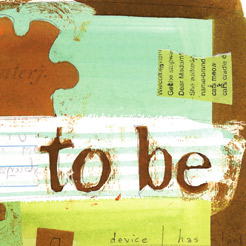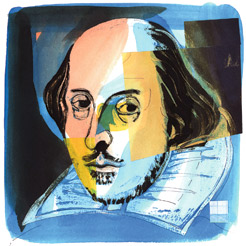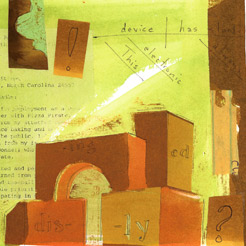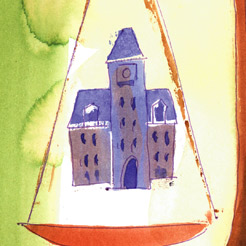
Several years ago, noted fiction writer and alumnus Tim O’Brien ’68 was reading an excerpt from a work in progress to a crowded chapel full of alumni. Macalester President Brian Rosenberg still remembers the scene.
O’Brien was ruminating about what it meant to have become a father late in life. “He was reading a letter to his children that said, ‘You’ll never know me. All you’ll ever know is this old version of me,’” Rosenberg recalls. As O’Brien was reading, Rosenberg looked around the chapel and noticed that many alumni had started to cry. Moments like that one, Rosenberg says, capture the spirit of the humanities and the essential role they play in a Macalester education. “It was so powerful. Everyone in the room was just knit together in a way we almost never see.”
 Ask eight humanities scholars to define what, exactly, the humanities are and you’re apt to get eight different answers. Most agree, though, that humanities is the umbrella term used to describe scholarly work, courses of study, and academic disciplines that take up, in one way or another, the question of what it means to be human.
Ask eight humanities scholars to define what, exactly, the humanities are and you’re apt to get eight different answers. Most agree, though, that humanities is the umbrella term used to describe scholarly work, courses of study, and academic disciplines that take up, in one way or another, the question of what it means to be human.
Answers to that question, they argue, cannot be discovered by breaking down the world into distinct variables that can be tested for significance. Meaning is discovered through interpretation, an act that is always somewhat subjective. The conclusions humanities scholars draw may not be objectively verifiable, but they insist, their work captures ideas and essences that aren’t observable in a Petri dish.
For much of the history of universities, the humanities were the only game in town. But in a world transformed by the rise of the sciences and social sciences, humanities scholars have perceived a decline in the value placed on their teaching and research.
The Humanities Indicators, a database created by the American Academy of Arts and Sciences several years ago, illustrate that decline in concrete terms. In 1967, almost 18 percent of all undergraduates left college with a humanities degree. In 2009, the last year for which data was available, 8 percent of undergraduates earned humanities degrees. In 1979, the federal government appropriated $403 million for humanities programs; in 2007, that was down to $138 million (measured in 2006 dollars).
According to some commentators, liberal arts colleges like Macalester are the privileged exception to the rule. But even if that’s so, the college is not resting on its laurels. Amid a national conversation about the worth of the humanities, Macalester faculty and alumni are more engaged than ever in asserting their value and safeguarding their future.
For religious studies professor Paula Cooey, the humanities are valuable because they prompt students to rethink their assumptions about the world. Cooey, the Margaret W. Harmon Professor of Christian Theology and Culture, doesn’t mince words when she describes how she teaches about religious deities in her theory and methods course. “I make everyone mad,” she says. Some students, she explains, come into the course as believers in a particular faith tradition. Others are non-believers who see deities as illusions. Both find themselves challenged. “If they’re devout, they have to start dealing for the first time with the constructed nature of culture and deities. And those who think that gods and deities have no meaning struggle with the fact that construction is real. It makes a difference,” she says, and has had enormously real consequences for human beings.
Asserting that ways of thinking and doing are not natural but are instead the product of creation is perhaps one of the most important contributions humanities scholars make. As English professor Neil Chudgar puts it, “We resist the notion that the world is given and something to theorize about. We insist on the ‘madeness’ of the meanings and theories we encounter. We raise and answer questions about how things assume the shape they assume.”
scholars make. As English professor Neil Chudgar puts it, “We resist the notion that the world is given and something to theorize about. We insist on the ‘madeness’ of the meanings and theories we encounter. We raise and answer questions about how things assume the shape they assume.”
Take the recent near collapse of the global economy. Complex and abstract financial instruments, such as credit default swaps, became part of a larger system that eventually collapsed. Social scientists might take that system on its own terms to identify how and why our economy began to collapse. But humanities–minded thinkers zoom out further in their analyses, identifying the values and processes that made that system—and credit default swaps—seem so normal and natural. “One of the things that’s freeing about the inquiry we do is that when you show the ‘madeness’ of the world, you show that it doesn’t necessarily have to be that way,” says religious studies professor Susanna Drake. “It’s not inevitable.”
That realization also creates a sense of responsibility, Chudgar adds. “Once you discover that meaning is made, not given, you have a responsibility to make meanings of your own that have ethical implications in the world.”
For the past eight years, Eden Bart ’87 has worked at the Minnesota Humanities Center in St. Paul on projects that do just that. As Minnesota’s population has become increasingly international, many state residents have yet to engage meaningfully with the implications of those changes—or with the state’s Native American history. Part of that work is happening through the center’s “absent narratives” initiative. In partnership with state organizations that advocate for communities of color, the center has developed everything from traveling exhibits to Internet videos designed to showcase the experience and contributions of Minnesotans whose stories have often gone untold.
“We work with them to change the narrative of marginalized communities from one of victimhood to a one of heroic survival against terrible odds,” says center president David O’Fallon. He points to “Why Treaties Matter,” a traveling exhibit created by the Minnesota Humanities Center in conjunction with the state’s American Indian Affairs Council, which toured the state last year.
An elderly Dakota man left hospice care briefly to see the exhibit, O’Fallon says. “It was his history being told, in his voice—not by others. And he wanted to be there for it.” The man’s presence at the exhibit was transformative for those there on the day he visited. “There was an incredible sense of the shared humanity of the visitors to the exhibit, who saw him not as some poor Native American elder in his last days but as a proud member of a sovereign nation that they are living with now.”
Many of the absent narratives projects, Bart points out, take the form of professional development opportunities for Minnesota K–12 teachers, who remain disproportionately white. “We’re working with teachers at a deeper level to bring about a new way of looking at how they’re teaching, what they’re teaching, and the relationship between them and their students,” she says.
By fostering critical thinking, imagining alternatives to our present ways of doing things, and bringing communities together, humanities programs often provide value that isn’t measurable in dollars. But those programs still have to exist in a world that measures value monetarily.
 Recognizing that reality, some college administrators and professors are considering how to more clearly broadcast the value of a humanities education. For years, faculty have been reassuring humanities majors that their educations have economic value. “What I usually tell students is that those who dismiss a humanities degree are often looking at short-term gain, and that training in the humanities provides an incredibly important foundation for many other fields they may wish to pursue,” says Joanna Inglot, Edith M. Kelso Chair of Art History. The critical thinking, writing, and analyzing skills students develop in courses on 16th century art will always be in demand in the 21st century—and they don’t have the expiration date vocational skills often do.
Recognizing that reality, some college administrators and professors are considering how to more clearly broadcast the value of a humanities education. For years, faculty have been reassuring humanities majors that their educations have economic value. “What I usually tell students is that those who dismiss a humanities degree are often looking at short-term gain, and that training in the humanities provides an incredibly important foundation for many other fields they may wish to pursue,” says Joanna Inglot, Edith M. Kelso Chair of Art History. The critical thinking, writing, and analyzing skills students develop in courses on 16th century art will always be in demand in the 21st century—and they don’t have the expiration date vocational skills often do.
But it’s not enough to provide that reassurance on an ad hoc basis, says Provost Kathleen Murray. “We’re very confident of our value, but we have to be able to tell people what that is. For too long we’ve just said, ‘We’re Macalester. Of course you know you’re going to get a good education here.’”
To remedy that information gap, the college recently launched an initiative to better quantify and promote the value of a Macalester degree to prospective students. Departments throughout the college, including those in the humanities, are revamping their websites to include mission statements that tell visitors what kinds of skills and knowledge their program imparts to students. Those statements also will eventually include data about the department’s alumni that demonstrate just how successfully it puts its mission into action.
Macalester is also working to promote the value of the humanities beyond its institutional borders. Part of the humanities decline can be attributed to its own retreat to the ivy tower in recent decades. Humanities scholars must have more of a public presence, says history professor Peter Rachleff. “We need to write op-eds, show up on public radio and television—be visible in our neighborhoods,” he says. “We need to show how the analytical tools that we develop inside the academy are valuable in wrestling with the complex issues we face outside it.”
One way in which humanities scholars can reach a broader audience is through an emerging national initiative called the digital humanities. In recent years, some humanities scholars have been pushing to harness technological power to expand the reach and nature of the humanities. They’ve digitized images of rare cultural artifacts, such as Greek pots or original texts, and have published them electronically, opening access to scholars and laypeople from around the world. But projects in the digital humanities go far beyond electronic archiving. They also involve presenting knowledge visually that might previously have been presented only in words, such as the layout and positioning of an ancient temple, for instance.
To bolster its participation in the digital humanities movement, Macalester recently won—in collaboration with Carleton and St. Olaf Colleges—a digital humanities planning grant from the Andrew W. Mellon Foundation that will enable faculty members to develop digital humanities projects over the coming year. Environmental studies professor Chris Wells, for instance, is collaborating with the Minnesota Historical Society to create a smartphone application that will give visitors to environmentally important sites information about their history and significance.
humanities planning grant from the Andrew W. Mellon Foundation that will enable faculty members to develop digital humanities projects over the coming year. Environmental studies professor Chris Wells, for instance, is collaborating with the Minnesota Historical Society to create a smartphone application that will give visitors to environmentally important sites information about their history and significance.
Projects like these will raise awareness beyond Macalester about the value of humanities scholars. “Humanities scholars around the country and world could do a better job of helping funders, lawmakers, grant-making agencies, and the public see the value of what we do,” says Adrienne Christiansen, director of the Jan Serie Center for Scholarship and Teaching. “The digital humanities project represents one exciting way to do that.”
While the future of the humanities in colleges may be uncertain, there’s much evidence to suggest that the needs the humanities fulfill— reflection, creative expression, appreciation of beauty—remain. Chudgar points, perhaps surprisingly, to dollar stores. “I’m always amazed by how many objects of decoration there are. Presumably, if you’re going to a dollar store you’re economically constrained and you’d want to be maximizing your economic utility. But what you find is row after row of things that have no use other than to do something not obviously useful.”
The question, it seems, is not whether the demand for the stuff of the humanities will be around in a hundred years, but whether colleges and universities will still play a primary role in meeting that demand. For Brian Rosenberg, the answer for his college is obvious. “Macalester will always be a place where the humanities occupy a central role. It’s who we are and what we are.”
October 16 2012
Back to top




